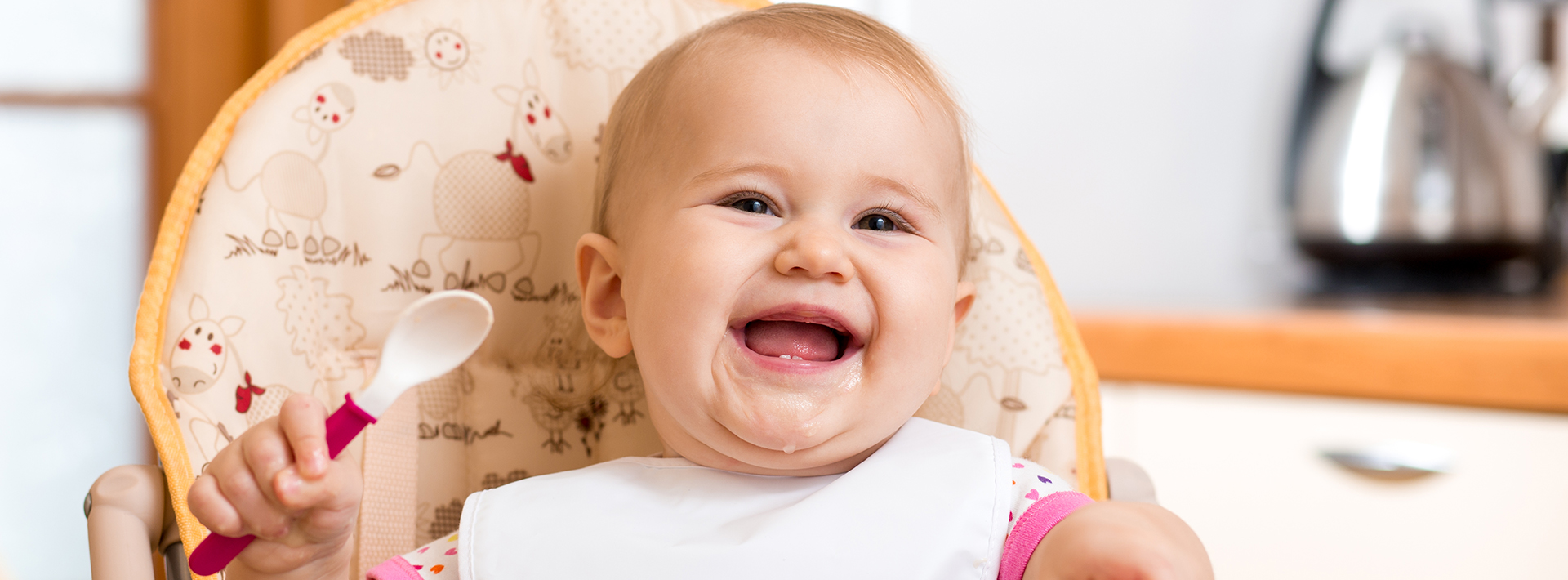Promoting good eating habits is considered extremely crucial since, besides abilities to obtain sufficient nutrition and proper physical growth, your baby will undergo indirect self-disciplines. Doing so will enable little ones to be aware of time and self-control, thus managing to sit and eat by themselves without parents’ assistance. Followings are the tips to encourage your baby to enjoy good eating habits.
- Self-practicing to eat at proper agesYour children should start eating by themselves when they reach approximately 6 months because it is the time when children manage to sit on a chair and use their hands to touch and hold things. Also, it is the age in which children feel curious about their food.
- Practicing to eat at proper time Parents should fix time for each meal clearly and similarly every day. They must try not to feed babies when the little ones are sleepy and limit individual meal time not to exceed 30 minutes. When time is over, parents should put all food away and should not give their children any snacks or other supplements. Neither should they give children any snacks and milk before a meal. When children look fussy while eating, parents must not scold or pressure them. Doing so will make children resist eating a lot more.
- Practicing to eat on a chair Children should practice to eat on a chair even for the first time. Parents should be insistent by not allowing them to leave the chair before finishing any meal. Doing so will enable children to learn that they should have a meal properly at the table. It is recommendable that parents have a meal with their little ones since children often imitate adults and have more appetite of eating with others.
- Letting children eat by themselves Initially, children may think that spoons, glasses, plates, bowls and food are new toys. They may spill food without eating it at all or spit it out. This is normal and mothers should particularly be prepared. It is recommendable that 2 sets of eating utensils are prepared. The first one, containing a little food and water, is for children to try eating by themselves. Children will be taught on how to eat by using this set of eating utensils. The second set will be used by mothers to feed their children. Food should be soft, sticky and easy to grab, such as carrots, crackers or boiled potatoes.
- Food should not be too much. Parents should give food to children little by little to ensure that they can have it all. More food can be provided only after children finish the last one. Doing so will familiarize children to finish all food one at a time.
- Practicing to eat various food. Various food menus should be available and parents are suggested diversifying them. In case children do not want to eat anything, mothers must not stop what children do not have as 10-15 efforts are probably given until children learn to have new food. Parents may mix new food with the one children are familiar with and add it little by little until they do not know that new food is added. Otherwise, parents can arrange various kinds of food in a plate like mixing soft, hard and sticky foods together so that children enjoy eating and learning to have different kinds of food. Moreover, children will also learn how to improve muscles and eye contacts.
- Accepting picky nature of children. When babies become toddlers, they start knowing what they like or dislike, thus developing picky nature. The amount of food they have will vary depending on the one they like or hate, so mothers should not force or make their children to have food they do not like. Doing so will make children resist the food more and, when they grow up, they will hate it completely.
- Creating good atmosphere. Family members should have meals together at the table. During the meal, no other activities, such as watching TV or playing toys, are allowed because children will not pay attention to eating. Also, parents should not scold their children or make them eat as negative attitudes towards food may occur. Parents must not force children to completely finish all food because pressure will take place between them and their children.
- Being a good role model. Parents should be a good role model to their children by having nutritious and healthy food. They should also have various food and avoid too much dessert and soft drink.
- Have patience, take it seriously and be consistent. Teaching children about how to eat properly necessitates continuous disciplines so that the little ones know how to eat by themselves. Parents should not express worry or anxiety towards eating and unreasonably complain and punish children during the meal. Children should not be forced to have what parents want, either, so that they do not negotiate eating or not eating with their parents later. Such behavior may develop to emotional ones in the future.
A lot of thanks to information provided by Dr. Piyarat ‘Ann’ Lertbannaphong, a specialized pediatrician.
Crated At 26/04/2018






















